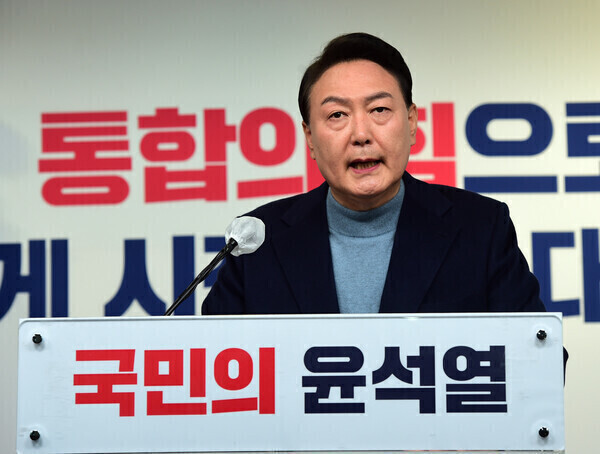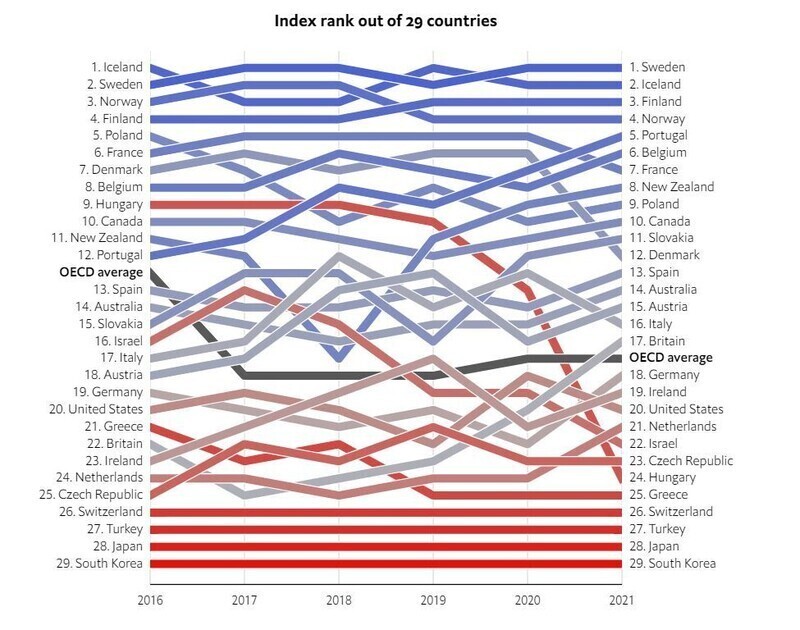hankyoreh
Links to other country sites 다른 나라 사이트 링크
Asked about gender inequality in S. Korea, Yoon calls issue “politically framed” in WaPo interview

President-elect Yoon Suk-yeol is drawing attention once again for his contradictory responses to questions about gender issues in the foreign press.
After describing himself as a “feminist” in a written response to the foreign press prior to his election, Yoon later backtracked on that as having been “polished” by the People Power Party.
In an interview with the Washington Post published Thursday, Yoon said that the gender issues that came up during the race to the Blue House were “politically framed” and “far from the essence of gender issues.”
His response conflicted directly with the general consensus that Yoon himself was the one who made political fodder of gender issues — raised primarily by male-dominated communities — with his social media pledge to “abolish the Ministry of Gender Equality and Family” (MOGEF) and “ramp up punishments for false accusations” on the campaign trail.
In the interview, Yoon also said that while men outnumber women among his Cabinet nominees, women will “take over in the near future.” These remarks came after he had abolished the Moon Jae-in administration’s quota policy for female Cabinet members, with women representing just three of his ministerial nominees for 18 ministries — or 16.75%.
It's difficult to tell if this was meant to indicate his plans to employ more female ministers as the figure with administration appointment powers over the next five years.
Despite “global standard” claims, women make up just 3 of 18 Cabinet nomineesIn the context of the Washington Post interview, the question that Yoon had been asked prior to this response concerned South Korea “consistently rank[ing] among the lowest in developed countries in the world when it comes to the gender pay gap, women’s advancement in politics and influence, and economic participation.” As president-elect, he was asked about the “role that [his] government can and should have in closing gender gaps in South Korean society.”
His answer reflected a premise that conflicted with the perceptions informing his pledge to abolish the MOGEF and his remarks about there being “no structural gender discrimination.”
“If we look at the older generation, there is still a lack of women in high-level positions, but their presence in such positions is growing very fast thanks to our commitment to equal opportunities,” he replied.
He went on to say, “While the majority of our ministers are men, for now, women will take over in the near future.”
“I have a clear principle that we must conform to global standards for social and government activities, and gender issues, and guaranteeing women’s opportunities must also go in line with global standards,” he also said.

Yoon further said, “The gender issue that emerged during South Korea’s presidential race was a politically framed one that is far from the essence of gender issues.”
He added, “[U]nlike the older generation, the younger generation grew up without facing systemic discriminations collectively as men and women.”
He concluded his response to the question by reiterating his stance that gender equality should be approached “on a case-by-case basis” rather than from a perspective of structural discrimination.
Despite Yoon’s claims of a rapid increase in women’s representation in high-level positions and the younger generation having grown up “without facing systemic discriminations,” the reality is far different.
On March 8, The Economist published findings for its “glass-ceiling index,” reflecting factors such as the gender gap in pay, representation of women in executive positions, women’s participation in economic activity, and the proportion of female lawmakers. South Korea came in 29th out of 29 countries examined.
With South Korea ranking at the bottom for the 10th straight year since 2013, it is difficult to reach Yoon’s conclusion that the situation for women has been improving quickly. South Korea performed particularly poorly in areas related to women’s representation in high-level positions, ranking 29th for the percentage of women in executive positions, 28th for their representation in managerial positions, and 27th for their representation in parliament.
Who is exploiting the online backlash?Some analysts said the “political frame” remarks were also difficult to comprehend.
Issues such as the abolition of the MOGEF and beefing up punishments for false accusations had been mentioned in male-dominated online communities before emerging as a major agenda over the course of the main conservative party’s primary. Yoon ended up including the MOGEF’s abolition among his 10 main election pledges. This led to an increase in the political focus on the online backlash, with an emphasis on the exclusion of women — but as a target of criticism rather than reflection.
The interview on Thursday was Yoon’s first one-on-one interview with a foreign news outlet since his election victory.
In another written interview with the same newspaper published on March 7, then-candidate Yoon said he considered himself to be a “feminist.” The ensuing controversy prompted his party to repudiate the remarks, which it said Yoon had never made.
After the Tokyo/Seoul bureau chief responsible for the interview disclosed the original Korean response and confirmed that the sentence was included, the party said the response had been “delivered without going through its final vetting.”
By Choi Yoon-ah, staff reporter
Please direct questions or comments to [english@hani.co.kr]

Editorial・opinion
![[Column] Has Korea, too, crossed the Rubicon on China? [Column] Has Korea, too, crossed the Rubicon on China?](https://flexible.img.hani.co.kr/flexible/normal/500/300/imgdb/original/2024/0419/9317135153409185.jpg) [Column] Has Korea, too, crossed the Rubicon on China?
[Column] Has Korea, too, crossed the Rubicon on China?![[Correspondent’s column] In Japan’s alliance with US, echoes of its past alliances with UK [Correspondent’s column] In Japan’s alliance with US, echoes of its past alliances with UK](https://flexible.img.hani.co.kr/flexible/normal/500/300/imgdb/original/2024/0419/2317135166563519.jpg) [Correspondent’s column] In Japan’s alliance with US, echoes of its past alliances with UK
[Correspondent’s column] In Japan’s alliance with US, echoes of its past alliances with UK- [Editorial] Does Yoon think the Korean public is wrong?
- [Editorial] As it bolsters its alliance with US, Japan must be accountable for past
- [Guest essay] Amending the Constitution is Yoon’s key to leaving office in public’s good graces
- [Editorial] 10 years on, lessons of Sewol tragedy must never be forgotten
- [Column] A death blow to Korea’s prosecutor politics
- [Correspondent’s column] The US and the end of Japanese pacifism
- [Guest essay] How Korea turned its trainee doctors into monsters
- [Guest essay] As someone who helped forge Seoul-Moscow ties, their status today troubles me
Most viewed articles
- 1[Column] The clock is ticking for Korea’s first lady
- 2After 2 months of delayed, denied medical care, Koreans worry worst may be yet to come
- 3[Column] Has Korea, too, crossed the Rubicon on China?
- 4US overtakes China as Korea’s top export market, prompting trade sanction jitters
- 5[Editorial] When the choice is kids or career, Korea will never overcome birth rate woes
- 6[Correspondent’s column] In Japan’s alliance with US, echoes of its past alliances with UK
- 7[Photo] Smile ambassador, you’re on camera
- 8Hong Se-hwa, voice for tolerance whose memoir of exile touched a chord, dies at 76
- 9Nearly 1 in 5 N. Korean defectors say they regret coming to S. Korea
- 10Strong dollar isn’t all that’s pushing won exchange rate into to 1,400 range